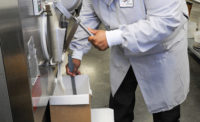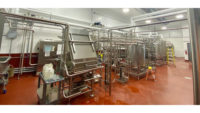Westby Cooperative Creamery sees new era of sales growth and product development



Westby’s Mark Rutlin, manager of sales and business development, said the Wisconsin Milk Marketing Board has been a good supporter of the co-op.


A refrigerated case at the company store in front of the creamery in Westby, Wis., is stocked with the co-op’s cheeses (left). The 2% version of its cottage cheese received a first place award in the 2012 World Dairy Expo Championship Dairy Products Contest.







This is not what you would call an overnight success. When it was established in 1903, the farmer-members of Westby Cooperative Creamery churned out 67,000 pounds of butter. Forty-one years later, the creamery started making cottage cheese (for Bowman Dairy in Chicago). By 1992, the co-op rolled out its first branded product.
When the ball in Times Square dropped to signal the start of a new millennium, things finally began to heat up for this cheese and cultured dairy products processor based in Westby, Wis. Growth has occurred deliberately and regularly. From 2004 to 2012, Westby more than tripled its annual revenues from $15 million to $50 million. At the same time it began producing new products: yogurts (2005), organic dairy foods (2006), cream cheeses (2007) and Greek yogurts (2011).
Westby Cooperative Creamery is not a well-known name to the general public. Its Westby branded products are sold primarily in Wisconsin and Minnesota. But food processors and other dairy brands know this vertically integrated dairy products cooperative. Westby derives over three-quarters of its sales from contract manufacturing of private label and ingredients products, and sales to foodservice institutional customers. At one point in its history, it made cottage cheese for Dean Foods, 500-pound barrels of cheese for Borden and 68-pound packs of butter for Uncle Sam.
Today, Westby co-packs cheeses and cultured dairy foods for dairy brands in the Midwest and California. It sells yogurt to food manufacturers who add it to their salad dressings. Westby’s dry curd cottage cheese ends up as an ingredient in lasagna. Local school boards, restaurants and hospitals like the fact that Westby products are made in Wisconsin.
Dairy farmer and Board President Loren Oldenburg and General Manager Pete Kondrup are leading Westby Cooperative Creamery into a new era of revenue growth and product development. Revenues increased to $50 million in 2012 (over $30 million in manufactured dairy food product sales and nearly $20 million in fluid milk sales). Last year the creamery manufactured nearly 25 million pounds (a record) of dairy foods, including cottage cheeses, sour creams, dairy dips, yogurts, (butter is now out-sourced) cheese curds, soft cheeses and hard cheeses.
“We’re a premium product and a local manufacturer. That resonates with some retailers and food co-ops,” said Retail Sales Representative Kevin Gittens.
The dairy co-op
The co-op members (called “patrons”) farm small dairy herds throughout Wisconsin and Minnesota, with many in and around the city of Westby and Vernon County, about a two-hour drive northwest of Madison. A typical farm has 30 to 100 cows, said John Schedivy, a field services manager. At the end of 2012, the cooperative’s membership included 160 local family dairy farms. By August 2013, there were 170. The members produced nearly 125 million pounds (a record in 2012) of conventional and certified-organic fluid milk. All milk supplied is rBST-free.
The organic farms are certified by several different organic organizations, with the creamery-plant certified by the Midwest Organic Services Association, Viroqua, Wis. The Cornucopia Institute, a Wisconsin-based public interest group that promotes family farming and sustainable and organic agriculture, rates the co-op highly. It gives the co-op an “excellent” rating of four cows (out of five).
The seeds for the record year in 2012 were sown a decade ago. Just before celebrating its 100th anniversary, the board of directors had to make some hard decisions about the viability of the cooperative and figure out where its future lay.
In 2002, Westby applied for and later received a Value-Added Producer (VAP) grant of $37,200 from the U.S. Department of Agriculture to analyze marketing opportunities. The co-op identified nine new product lines. The following year, the co-op used a $438,000 grant to provide the working capital needed to develop these products, including yogurts. Other grants in later years, ranging from $150,000 to $300,000, helped the co-op increase market share in the yogurt industry, expand production of farmer’s cheese and develop organic cottage cheese and sour cream products.
The USDA says the VAP program funds projects that “have aided in the creation of new economic opportunities for farmers and communities looking to keep a greater share of retail food dollars at home by processing and packaging them locally, rather than shipping commodities elsewhere for processing.”
Around 2005, the co-op was seeing increased consumer demand for organic products, including dairy foods and beverages. Farmers, including Westby members, were converting their dairies to organic operations. Faced with a potential loss of membership, the board in 2006 voted to admit organic dairy farmers. That has proven to be a boon to membership and revenues. Most of Westby’s hard-cheese production is in organic product for co-pack partners.
“Westby is able to respond to fast-emerging market trends,” said James Robson, CEO of the Wisconsin Milk Marketing Board, Madison. “Under the leadership of general manager Peter Kondrup and an involved board of directors, the organization is well positioned to play an important role for farmers in western Wisconsin for years to come,” Robson said.
Brad Legreid, executive director of the Wisconsin Dairy Products Association (WDPA), knows Kondrup well. (Association members elected Kondrup president in July.) Legreid said Kondrup provides “high-level visionary leadership” to the co-op and has a “quiet and humble” management style.
Award-winning products
A point of pride with the co-op is that it is the only cottage cheese processor in Wisconsin. The creamery also makes sour creams, dairy dips, yogurts, hard cheeses and cream cheeses. It no longer makes butter; that product is outsourced. Westby manufactures these products in a small facility about a mile from the corporate headquarters and distribution center.
Westby-brand products won three first place awards at the 2012 WDPA’s World Dairy Expo Championship Dairy Products Contest for 2% low-fat small curd cottage cheese, sour cream, and French onion dairy dip. It snared a fourth award (second place) for its roasted red pepper dip.
The majority of the co-op’s revenues come not from sales of Westby-branded products, but from co-packing, sales of ingredients and from foodservice/institutional sales. Westby is an efficient processor that can handle small-batch production runs. It can make up to a dozen different products a day. This agility has helped the company secure contract manufacturing clients around the nation. The creamery ships products to both coasts; a distributor puts Westby-made dairy products on cruise ships in the Caribbean.
The owner of a start-up yogurt brand said he selected Westby because shipping product to either coast from Wisconsin is inexpensive. The client (who requested not to be identified) also cited the co-op’s high-quality organic milk as a factor. A third factor in choosing the cooperative as a manufacturing partner is that “we like them as people,” he said.
The creamery’s dairy products also are available in bulk sizes (5-, 30- and 40-pound containers and 55-gallon drums) for foodservice and industrial customers. Other dairy brands source ingredients (like dry curd cottage cheese or yogurt) for use in their product manufacturing. The creamery’s cheeses end up in blintzes, lasagnas and salad dressings.
Though Westby is hardly a national brand, it is a local favorite. The small retail cheese store in front of the plant on Main Street in Westby (population of 2,200) is a preferred-stop for locals and tourists to buy cheese curds, cheeses and other fresh-from-the-factory cultured dairy foods. Customers live by the co-op’s slogan: “Take home country goodness!” Westby also sells products from its Country Goodness online store (www.westbycreamery.com).
Sales, marketing and advertising
Westby taps its Wisconsin connections for sales and marketing support. The Wisconsin Milk Marketing Board has been a good supporter, said the co-op’s Mark Rutlin, manager of sales and business development.
WMMB partners with Westby by providing cost-sharing funds to conduct in-store demos. Many of Westby’s products carry the Wisconsin cheese logo, signifying that the product was made in Wisconsin. The co-op has also participated in WMMB’s trade advertising allowance program.
“Westby has a strong reputation among retailers for producing quality products,” said WMMB CEO Robson. “They’re a leader in cottage cheesemaking in Wisconsin.”
Rutlin represents the co-op at trade shows, including the Wisconsin Restaurant Association and events put on by the Institutional Food Market Coalition, which promotes locally grown produce and locally made food products. Consumers’ interest in where their food comes from and how it is manufactured has benefitted Westby.
To show how fresh their food is, some retail customers promote the concept of food-miles (the distance food travels from the source to the store). The independent Wisconsin-based chain Metcalfe’s used a circular this summer that promoted its proximity to its suppliers, including Westby.
The cooperative’s farmers say they take pride in seeing Westby branded products on store shelves. These dairy foods are the end result of the hard work of dairy farming. Some months the arithmetic of sales minus costs of sales does not work in favor of farmers. They seem to shrug it off.
“Of course it is hard, but what isn’t?” asked Kay Yanske, a farmer and secretary/treasurer of the co-op.
Board president Oldenburg describes the rewards of dairy farming in what sound like postcard images: sitting on the porch at the end of the day and watching the sun set over the farmstead. There’s country goodness in that, too.
Looking for a reprint of this article?
From high-res PDFs to custom plaques, order your copy today!












